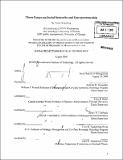Three essays on social networks and entrepreneurship
Author(s)
Greenberg, Jason, Ph. D. Massachusetts Institute of Technology
DownloadFull printable version (12.27Mb)
Alternative title
3 essays on social networks and entrepreneurship
Other Contributors
Sloan School of Management.
Advisor
Roberto M. Fernandez, Toby E. Stuart, James M. Utterback and Ezra W. Zuckerman-Sivan.
Terms of use
Metadata
Show full item recordAbstract
This thesis explores in three essays if, how, and why social relationships have a bearing on outcomes in the entrepreneurial process. The first essay attempts to determine which mechanism drives the children of business owners to expect to become and actually enter business ownership themselves. Results are inconsistent with arguments asserting that the intergenerational correlation is a result of: the transmission of human capital or financial capital; the expectation of inheriting a business; a heightened awareness of the viability of business ownership; or preferences for having lots of money. Findings are consistent with the notion that the intergenerational correlation in business ownership is a result of shared preferences/traits such as overconfidence. Social capital is a multifaceted concept. However, a disproportionate share of network research has been dedicated to the theorization and transmission of one form of social capital information. Indeed, network structure is generally considered a proxy for information flow. This assumption is often reasonable. In important contexts of social and economic interest it can, however, be misleading. This essay draws attention to the specific "substances of advantage" that flow to different types of actors across varied dyadic ties. Two concepts-(non)rivalry and (non)excludability-are introduced to explain why certain substances of advantage are (not) transmitted across different types of dyadic ties to actors with distinct categorical characteristics. (cont.) Empirical analyses of representative data of individuals in the process of founding a business are employed to demonstrate the value of this framework. In one of the most influential arguments in organization sociology Arthur Stinchcombe argued that new as opposed to old organizations are more likely to die because of a "liability of newness." The thesis writ large has received empirical support. Stinchcombe actually identified four mechanisms that individually and collectively compose the liability. One of the liabilities he identified specifically argued that new organizations are more likely to die because they must rely upon relations among strangers. On the other hand, research suggests that strangers are particularly well suited to act as bridging ties, which afford advantages in the startup process by offering access to information about market opportunities, novel resources, and information. This social structural mechanism is consistent with Schumpeter's view of entrepreneurship as novel combination. This third essay assesses whether including strangers on a founding team or as employees is net positive or negative.
Description
Thesis (Ph. D.)--Massachusetts Institute of Technology, Sloan School of Management, 2009. Cataloged from PDF version of thesis. Includes bibliographical references.
Date issued
2009Department
Sloan School of ManagementPublisher
Massachusetts Institute of Technology
Keywords
Sloan School of Management.